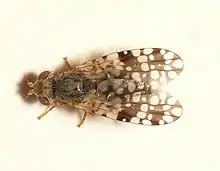Tephritis praecox
Tephritis praecox is a species is a species of fly in the family Tephritidae found across Europe.[3]
| Tephritis praecox | |
|---|---|
 | |
| Tephritis praecox | |
| Scientific classification | |
| Domain: | Eukaryota |
| Kingdom: | Animalia |
| Phylum: | Arthropoda |
| Class: | Insecta |
| Order: | Diptera |
| Family: | Tephritidae |
| Subfamily: | Tephritinae |
| Tribe: | Tephritini |
| Genus: | Tephritis |
| Species: | T. praecox |
| Binomial name | |
| Tephritis praecox | |
| Synonyms | |
Description
The adult fly is grey-brown in colour with a wing length measuring between 1.8–3.2 mm. The wings are hyaline and distinctively marked between different species of this genus.[4]
Biology
T. praecox is associated with several host plants including Calendula arvensis, Chrysanthemum sp., Filago gallica, and Senecio. When mating, male flies wait near the capitulum of their chosen flower bud. When a female appears they begin a mating dance during which the male holds his wings flat and then opens them alternately.[4] The larvae develops in the seed head.
Distribution
T. praecox can be found across central and western Europe.[5] It was first noted from Britain in 1937 on the basis of a single female found in Suffolk in 1907.[6]
References
- Loew, H. (1844). "Kritische Untersuchung der europäische n Arten des Genus Trypeta Meig". Z. Ent. (Germar). 5: 312–437.
- Loew, H. (1869). "Revision der europäische n Trypetina". Zeitschrift für die gesammten Naturwissenschaft. 34 (7/8): 1–24. Retrieved 7 February 2021.
- Norrbom, A.L.; Carroll, L.E.; Thompson, F.C.; White, I.M; Freidberg, A. (1999). "Systematic Database of Names. Pp. 65-252. In Thompson, F. C. (ed.), Fruit Fly Expert Identification System and Systematic Information Database". Myia. 9: vii + 524.
- White, I. M. (1988). Tephritid flies. Diptera: Tephritidae (Handbooks for the Identification of British Insects Vol. 10, Part 5a) (PDF). Royal Entomological Society of London.
- "Tephritis praecox (Loew, 1844)". Fauna Europeana. Retrieved 6 February 2020.
- Collin, J.E. (1937). "Trypeta vectensis sp.n. and other new or little known British species of Trypetidae (Diptera)". Entomologist's Record and Journal of Variation. 49: 1–7.